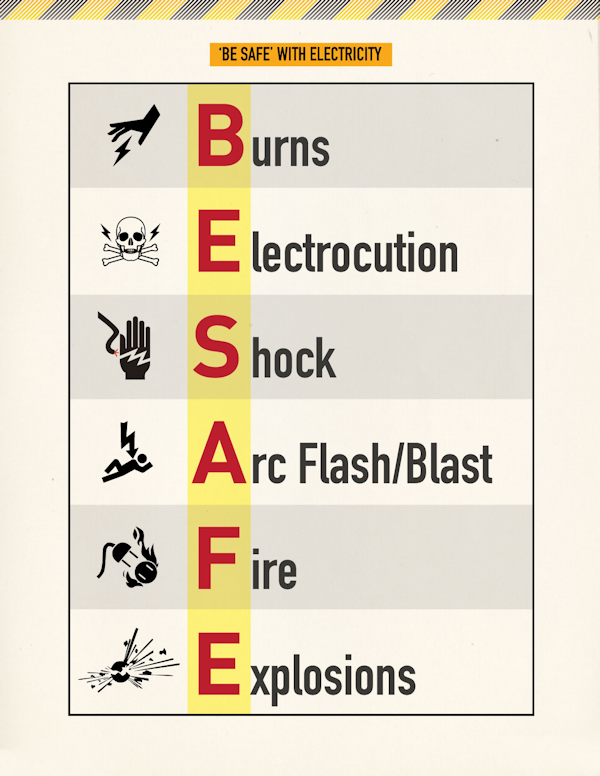Electrical Accident causes and preventions
An electrical accident is an undesired, unexpected event that has been caused by an electrical current and has resulted in either injury or property damage. Electrical accidents are more common than you expect.
In order to remain safe when using electrical equipment and appliances, it’s worthwhile to familiarise yourself with basic electrical safety knowledge. This will help to minimise the risk of incidents and prevent accidents.
Main causes of electrical accidents
In a world where we use electrical devices, appliances and equipment in almost all aspects of everyday life, electrical accidents are understandably common. Yet most can be prevented by understanding the dangers. Typically, electrical accidents are caused by contact with water, faulty wiring, attempting to fix electrical devices yourself, naked cords and damaged plugs. So, let’s take a closer look at each of these causes.- Water is a conductor of electricity and can, therefore, be extremely dangerous when put into contact with an electrical current. Electrical appliances can come into contact with water fairly easily in daily life, for example, if you spill a glass of water on your desk at work or have hair straighteners and hairdryers in the bathroom.
It is extremely important that you minimise the risk of an electrical shock by moving electrical appliances away from water and ensuring that any drinks are secure so that the chance of spillages is reduced. - Faulty wiring can occur for many reasons, including poorly installed equipment, incorrect use and a lack of maintenance. Particularly in the workplace, wires and cables should be regularly inspected by a professional electrician to ensure that health and safety standards are met.
- Overloading at socket outlets and/or extension leads may cause the circuit to overload. This can not only be harmful to the user but also risks damage to expensive equipment within the home or workplace.
- Attempting to fix electrical faults-Many people believe that using DIY methods on electrical wiring and cabling is as easy as hammering a nail into the wall, but this is most definitely not the case.
In fact, by attempting to fix electrical equipment without any training, you can put yourself at serious risk of an electric shock and, if not correctly resolved, more severe consequences. - Naked cords & damaged plugs-Damaged cords can occur when an electrical appliance is overused or misused, causing the protective outer sheath to split, exposing the wires inside. This can be extremely dangerous as the sheath is designed to insulate the conductors and prevent injury. Without this sheath in place, you could come into contact with a live current. Caution should be exercised when handling damaged wires and cables – make sure the power is turned off before taking any other action. If something that you cannot simply remove and replace is damaged, we advise that you contact an electrician.
How to prevent electrical accidents at home
Most of these solutions are common sense but we often overlook them, thinking that the risk isn’t too high or that the consequences aren’t likely to be severe:- Have installations checked by approved electricians: It is highly recommended to get all of your electrical installations assessed by certified professionals every ten years.
- Never use damaged appliances: You should never continue to use a damaged extension cord or defective device, even if it doesn’t seem dangerous.
- Unplug appliances with care: Do not pull on the wire to unplug devices as this can damage the cable.
Instead, remove the plug directly from the socket. - Be careful when drilling into walls: If you plan to make holes in a wall, be sure to use an electricity detector before hand to spot any power sources. This will prevent you from drilling into a wire, for instance, and causing a severe accident.
- Do not overload sockets: Although it may be tempting to plug all of your devices into a multi-outlet socket, try to spread them between several outlets to prevent overheating.
- Keep appliances away from water: Aside from the obvious examples, this should also include ensuring that you unplug your iron before filling it up with water.
Dipashri Patil Electrical Engineer
Instead, remove the plug directly from the socket.








Comments
Post a Comment